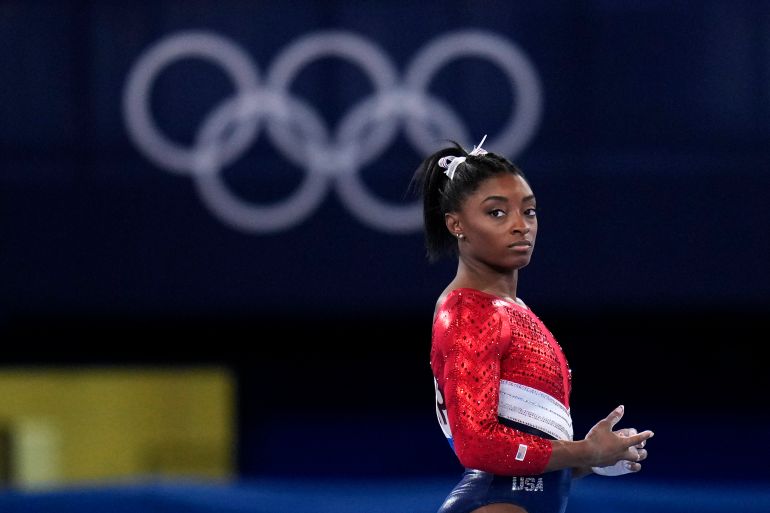Why gymnast Simone Biles has transcended her sport
As far as Biles’s achievements go, perhaps those at the Tokyo Olympics have been her most impressive.

How does an athlete transcend their sport? Complete dominance in their field must be one factor. The other could be taking a stand for something and in doing so moving us forwards as a society. By withdrawing from several Olympic events this past week to protect her wellbeing, Simone Biles – the most decorated gymnast of all time – has done just that.
After landing badly from a vault that went awry, Biles decided to bow out from the women’s team gymnastics final, cheering her teammates on from the sidelines instead. At the news conference that followed, she explained that she had pulled out for mental health reasons. We later learned she had a case of the “twisties” – a dangerous phenomenon experienced by gymnasts robbing them of all sense of direction during aerial feats. Given the complexity of the manoeuvres Biles executes, continuing under these circumstances could have been disastrous.
Keep reading
list of 4 itemsIn India’s richest state, exam scams kill escape from farm crisis
Displaced 12-year-old boy becomes Gaza’s youngest medic
Why are so many young Americans suffering from mental distress?
Although the “twisties” are poorly understood, experts believe they may occur when gymnasts are stressed and overthink movements which are usually automatic, confusing the brain and throwing off their proprioception or sense of positional awareness.
Biles had plenty of reasons to be stressed. She described the burden of these Olympics, where she was widely expected to win five gold medals, as having “the weight of the world” on her shoulders. The COVID-19 pandemic has cast a shadow over the Tokyo Olympics, exacerbating the stresses usually felt by Olympic athletes. After an extra year of gruelling training due to the postponement, they are now competing with no audience and no family support.
The sexual abuse Biles suffered at the hands of former US gymnastics team doctor Larry Nassar had a profound detrimental effect on her mental health. As a Black athlete in an overwhelmingly white sport, she has also had to endure racism throughout her career. She said therapy and medication have been helping but it is hardly surprising that she has not been at her best mentally in Tokyo.
Although she has received widespread praise for her decision to withdraw, unhelpful attitudes still persist. British journalist Piers Morgan, whose mission in life appears to be rubbishing the mental health challenges of women of colour, described her withdrawal as “a joke” and “weakness”. Texan Deputy Attorney General Aaron Weitz described her as “selfish” and “a national embarrassment”.
Middle-aged white men insisting women of colour sacrifice their health to perform at their behest is utterly sinister. Perhaps they should review Biles’s record of competing with broken toes and a kidney stone before accusing her of weakness. Or familiarise themselves with the tragedy of Elena Mukhina, the Russian gymnast who was left paralysed when pushed to compete despite being unfit, before branding her an embarrassment.
Although USA Olympics and the International Olympic Committee (IOC) came out in support of Biles (in stark contrast to the treatment of tennis superstar Naomi Osaka by the French Open Executive recently), the sporting establishment still has much to do in protecting the mental health of athletes.
The pressures of professional sport and its effect on mental health are well recognised – 34 percent of elite athletes are thought to suffer from depression and anxiety. The physical and psychological demands of training and competing, the fear of injury and devastation when it occurs and long stints travelling away from supportive family and friends are all factors, along with the intense public and media scrutiny. Elite athletes are also less likely to seek help for mental health problems due to the stigma they attract, concerns about perceptions of weakness and the reaction of sports administrators.
The IOC has taken some steps to remedy this, including making psychologists available in the Olympic Village and setting up 24-hour “mentally fit” helplines for athletes in 70 languages. But this is the same Olympics in which fencer Alen Hadzic has been allowed to participate despite numerous accusations of sexual assault levelled against him. The same Olympics where swimming caps designed specifically for Black athletes were banned. The IOC would do well to re-examine their policies around sexual safety and racial equality to “create an environment that supports mental wellness” as recommended in their own 2019 consensus statement on mental health.
More broadly, Biles’s decision to withdraw should be a wake-up call to protect the mental health of athletes before they get to breaking point. Many athletes have spoken out about their struggles with mental ill-health, but few have sacrificed winning for their wellbeing. The sports industry and individual athletes should take their cue from Biles and in her words “put mental health first”. Encouraging open dialogue, taking a proactive approach to screening for mental illness and making treatment more accessible at all levels, across all sports could make all the difference.
As far as Biles’s achievements go, perhaps those at Tokyo have been her most impressive: Bravely prioritising her health over the expectations of others. Showing fans around the world that wellbeing is paramount, no matter the stakes. Selflessly letting her teammates take over when she knew she could not do her best. Staying on to provide encouragement to help them win medals. Her elegance in handling the fallout from all this matches that of any of her finest gymnastic skills. If a champion should be judged by their grace in loss as well as their victories, Biles has shown us exactly why she is the greatest gymnast of all time.
The views expressed in this article are the author’s own and do not necessarily reflect Al Jazeera’s editorial stance.
